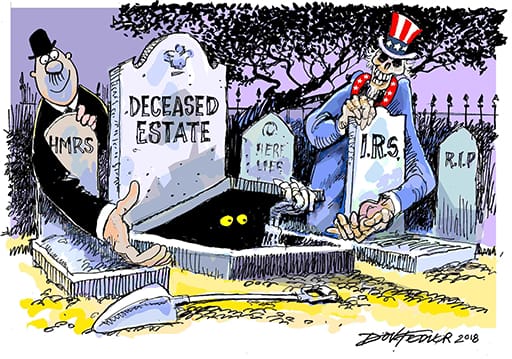
We can think of many swear words starting with the word ‘s’, but in the tax world one of the worst ones you will hear is “situs”.
It is commonly known that on death, the tax levied in South Africa is called estate duty. Even though death is where it ends for you, from a tax perspective, if you hold assets abroad, it is only the beginning.
Situs is Latin for “position” or “site”. The situs of an asset is generally the place where an asset is considered to be located for legal purposes. For example, the situs of immovable property is the place or country where the property is situated, or in the case of a company, where incorporated or where the share register is maintained.
However, not so commonly known is that on death, both the UK and the US also levy an estate duty on certain situs assets
On death, South African residents are liable for estate duty based on their worldwide assets. Estate duty is currently levied at a rate of 20% in the case of an estate less than R30 million, and at a rate of 25% on the value above R30-million.
However, not so commonly known is that on death, both the UK and the US also levy an estate duty on certain situs assets, i.e. certain assets that are physically situated within their jurisdiction. In the UK this is known as inheritance tax and in the US it’s called estate tax. Collectively, they are known as situs taxes. This is important to note if you have assets in either country.
In the UK, 40% situs tax will be levied on situs assets over the value of £325,000. Any amount falling below the £325,000 threshold is known as “the nil rate band” and is free from situs tax. Each individual receives this £325,000 exemption. There will be no situs tax levied on any situs assets left to a surviving spouse. In addition to this, if the situs assets are left to the spouse, which results in the £325,000 exemption not being used, the exemption will roll over to the spouse. The spouse will then have a £650,000 exemption on their death.
In the US, the threshold for situs tax is dangerously low at only $60,000. The top bracket for estate tax is 40% on US situs assets. In contrast to the UK, the US offers no spousal exemptions or rollovers unless the spouse is a US citizen.
So, on death, you will be in for 20% SA estate duty, as well as a potential 40% situs tax on your US and UK situs assets. You must be thinking: “Is that not a double tax?” You are correct, but all is not lost.
It is important to ensure that the executor of your estate is aware of the situs applicable to your assets
To prevent double taxation, SA has entered into an estate duty agreement with both the UK and US, the terms of which allow the countries in which the situs assets are located to tax such assets.
South Africans will be able to claim a credit in SA for the situs taxes paid in the UK and US. However, the credits will be limited to a maximum of the 20% SA estate duty payable on the asset, even though you may have paid 40% in the US and UK. This essentially means that instead of paying 20% SA estate duty, you will pay 40% situs tax.
It is important to note that a credit is not automatically applied. It is your executor’s responsibility to ensure the credit is claimed and applied. If this is not done, you may end up paying both 20% SA estate duty and 40% situs tax. It is important to ensure that the executor of your estate is aware of the situs applicable to your assets. Failing to pay the necessary taxes may result in your executor becoming personally liable for the taxes and severe penalties for your executor and heirs.
Many people ask us: “How will we know about the situs tax?" Firstly, if an executor has not performed his/her duties and ensured the necessary taxes are paid, they may become personally liable for the situs taxes owing. Professional executors and estate administrators have therefore become the situs “policemen” for HMRC and the IRS. Secondly, global reporting and the automatic exchange of information means that the tax authorities most likely already know about the situs assets, which would have been reported under FATCA and the CRS.
Tips for investing offshore in a situs-efficient way
To avoid incurring unnecessary taxes arising on death, South Africans investing offshore should always consult their tax practitioners and ensure that they understand international tax law, before making decisions.
Investing through an offshore trust or an offshore company may in certain instances mitigate situs exposure. However, this would require specialised structuring.
Investments through certain offshore unit trust portfolios, Exchange Traded Funds (ETFs) and insurance wrappers registered outside the relevant jurisdiction, may not attract situs tax in certain instances, even if they hold underlying situs assets.
If you are already invested in assets which could attract situs tax, you could consider selling these investments and investing into platforms which are not considered situs assets. However, the capital gains and income tax consequences would need to be considered before doing so. If you do hold situs assets, and the value of the situs assets do not exceed the nil rate bands, there would be no situs tax.
The world continues to grow into a global network, as do the global tax laws applicable to your worldwide assets. It has become much smaller and more integrated. Failing to carefully consider the tax implications of where you invest could create unnecessary costs and expenses for you and your heirs.
About the authors

Rene van Zyl
Joint-head, Investec Tax & Fiduciary
Rene completed her law degree at the University of Stellenbosch and is an Admitted Attorney of the High Court of South Africa. After completing her articles in Cape Town, she joined a multinational offshore trust company, gaining extensive experience in global estate planning and structuring for high net worth individuals, while obtaining her H-dip Tax through Thomas Jefferson School of Law in San Diego, California. Rene was responsible for local and offshore products and solutions at FNB Fiduciary before joining Investec Wealth and Investment as a Tax & Fiduciary specialist in July 2017. Rene has been instrumental in building the Tax and Fiduciary offering for Investec during the last two years, and she was the first founding member of the team. She was also the representative for Digital Assets in South Africa for STEP. She was rated in the Chambers HNW 2019 for professional advisors. Every year they carry out thousands of in-depth interviews with clients in order to assess the reputations and expertise of business lawyers worldwide. The qualities they look for (and which determine rankings) include technical legal ability, professional conduct, client service, commercial awareness/astuteness, diligence, commitment, and other qualities most valued by the client.

Elizabeth Fick
Joint-head, Investec Tax & Fiduciary
Lizzie is an admitted attorney, currently busy with her Masters in Taxation. She specialises in tax and cross-border planning and structuring. Lizzie has vast experience in the drafting of local and offshore wills, estate and succession planning, trust and company law, local and offshore trust and company administration, exchange control regulations, tax law and opinions, as well as cross-border structuring and planning. Before joining Investec, Lizzie worked as an associate at a global law firm specialising in tax and cross-border planning, and as a Client Relationship Manager in trust and fiduciary services.
Receive Focus insights straight to your inbox




